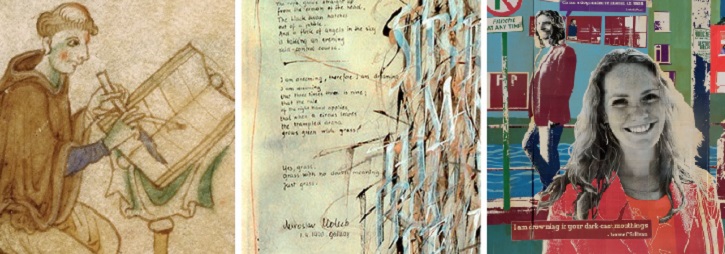In This Section
- English
- About the Department
- People
- Study
- Research
- News
- Media Gallery
- Edmund Spenser in Cork - School of English UCC
- Mary Breen: Pride and Prejudice
- MA in Irish Writing and Film
- Ann Coughlan: The Irish Influence on America's Greatest Abolitionist
- MA in Modernities: Romanticism, Modernism, Postmodernism
- MA in American Literature and Film
- MA in English Texts and Contexts: Medieval to Renaissance
- PhD in English
- Prof. Claire Connolly
- Tonio Colona - PhD in the School of English, UCC
- Prof Patricia Coughlan
- Mike Waldron - PhD in the School of English
- Ken Rooney and Heather Laird Book Launch
- School Welcome Event September 2014
- Contemporary American Trauma Narratives Book Launch
- Staged Transgressions in Shakespeare's England
- Seamus Heaney Memorial Event September 2013
- Creative Writing
- Current Students
- Student Achievements
- Digital Humanities
- Creative Writing

Taught MA Programmes
The Department of English offers the following taught MA programmes:
- MA in Modernities: Literature, Theory and Culture from the Romantics to the Present
- MA in Texts and Contexts: Medieval to Renaissance
- MA in Creative Writing
Up-to date information can be found in UCC's online prospectus.
The College of Arts, Celtic Studies and Social Sciences offers Excellence Scholarships for taught masters, and applicants to MA programmes in the Department of English are strongly encouraged to apply. The scholarships cover EU tuition fees, and are also open to international applicants from outside the EU. For information about these scholarships please visit the CACSSS Graduate School | University College Cork
MA Applications
Applications for all postgraduate programmes are made online through UCC's application system.
This online applications centre processes applications from both EU and non-EU students, for both taught and reseacrh (PhD) programmes, so be sure to select the correct section for your application.
The Programme Codes for the Department of English MAs are as follows:
-
MA in Modernities: Literature, Theory and Culture from the Romantics to the Present CKE29
-
MA in Texts and Contexts: Medieval to Renaissance CKE31
- MA in Creative Writing CKE10 (Full-time), CKE58 (Part-time)
Up-to date information on these programmes, including fees and the application process, can be found in UCC's online prospectus
Non-EU Applicants
Non-EU applicants for taught postgraduate programmes also apply online through UCC's application system.
Details of application procedures, minimum entry requirements and English language requirements for non-EU applicants are available from the International Education Office here: Study in ireland for international students
Please note that non-EU applications are reviewed on a rolling basis, so you should receive a decision on your application quickly. If you are awaiting a final degree result, you may receive an offer that is conditional on the award of your final degree mark.
Supplementary Candidate's Statement
The application form makes reference to a "Supplementary Candidate's Statement," which is designed to give applicants the
opportunity to supply further information to the MA coordinators on your reasons for applying for the MA.
-
It allows you to furnish details of your academic background in the chosen area (relevant modules completed at undergraduate level, in the humanities/languages departments or in other departments)
-
You can use it to give information on other courses taken (e.g. evening courses; certificate courses; summer courses etc) in relevant or cognate areas
-
You can supply us with details of involvement in literary, creative writing, film/media/visual arts clubs, groups etc.
-
If you’ve written relevant reviews, articles, scripts, or visual presentations (including films, records of installation work etc) you can attach them to your form.
The form allows you to make a statement on why you are applying for the MA, what you hope to bring to the class, and what you hope to gain from the programme. You can include references to literature, film and visual arts that you’ve already studied and enjoyed, as well as areas that you want to explore further at postgraduate level. For example, you might include ideas for a possible dissertation topic in your statement and any preliminary reading you’ve done in the area. Remember to fill in all sections of the form when you make your PAC application. You should view this statement as a method of ‘promoting’ yourself and your commitment to your chosen area. Lastly, do pay attention to writing style as it creates a negative impression if a candidate’s statement is poorly written!
English Department
Roinn an Bhéarla
Contact us
O'Rahilly Building, University College Cork, Cork. Ireland
